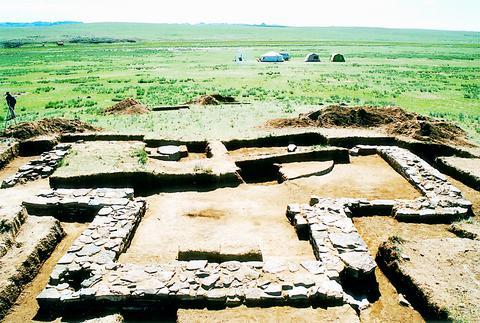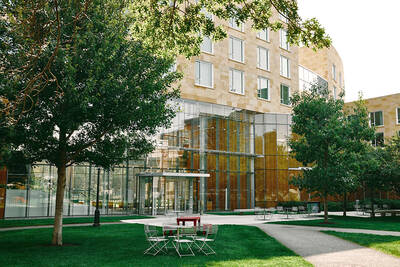The ruins of Genghis Khan's palace have been excavated in eastern Mongolia, a Japanese archaeologist said yesterday, estimating the conqueror's grave is near the site.
A joint Japanese and Mongolian research team has unearthed some 600,000m2 of the remains of the palace complex some 250km south-east of Ulan Bator.

PHOTO: AP/THE JAPAN-MONGOLIA JOINT RESEARCH TEAM, HO
Cornerstones and holes for pillars were found in what is thought to be a mausoleum near the centre of the remains believed built in the 13th century, when the savage warrior unified local tribes and founded the Mongol Empire.
Other unearthed articles include earrings and bronze accessories as well as incense burners with dragon designs often considered the symbol of an emperor.
The research team, which began their project in 2001, has also found the ashes and bones of horses and cows believed to have been used for a memorial service for the Mongol leader.
"We concluded it was his mausoleum because historical documents are saying such a memorial service was held to mark his death," said Noriyuki Shiraishi, assistant professor at Niigata University and head of the Japanese side of the 30-member team.
"According to various documents related to Genghis Khan, his grave is supposed to be located within a radius of 12 kilometers from the mausoleum," he said.
"We believe that with this finding, we have taken a step closer to locating his grave," he added.
The burial site of Genghis Khan remains unknown. He was believed to have been buried in an unmarked spot in the Mongolian Plateau.
While the team will continue their dig in the second phase of the project that will end in 2007, it will wait for permission from the Mongolian government to expand the project to find the grave.
Most historians agree that Genghis Khan died in 1227 while fighting in the region of Xixia, on the edge of the autonomous Chinese regions of Ningxia and Inner Mongolia.

‘THEY KILLED HOPE’: Four presidential candidates were killed in the 1980s and 1990s, and Miguel Uribe’s mother died during a police raid to free her from Pablo Escobar Colombian presidential candidate Miguel Uribe has died two months after being shot at a campaign rally, his family said on Monday, as the attack rekindled fears of a return to the nation’s violent past. The 39-year-old conservative senator, a grandson of former Colombian president Julio Cesar Turbay (1978-1982), was shot in the head and leg on June 7 at a rally in the capital, Bogota, by a suspected 15-year-old hitman. Despite signs of progress in the past few weeks, his doctors on Saturday announced he had a new brain hemorrhage. “To break up a family is the most horrific act of violence that

HISTORIC: After the arrest of Kim Keon-hee on financial and political funding charges, the country has for the first time a former president and former first lady behind bars South Korean prosecutors yesterday raided the headquarters of the former party of jailed former South Korean president Yoon Suk-yeol to gather evidence in an election meddling case against his wife, a day after she was arrested on corruption and other charges. Former first lady Kim Keon-hee was arrested late on Tuesday on a range of charges including stock manipulation and corruption, prosecutors said. Her arrest came hours after the Seoul Central District Court reviewed prosecutors’ request for an arrest warrant against the 52-year-old. The court granted the warrant, citing the risk of tampering with evidence, after prosecutors submitted an 848-page opinion laying out

North Korean troops have started removing propaganda loudspeakers used to blare unsettling noises along the border, South Korea’s military said on Saturday, days after Seoul’s new administration dismantled ones on its side of the frontier. The two countries had already halted propaganda broadcasts along the demilitarized zone, Seoul’s military said in June after the election of South Korean President Lee Jae-myung, who is seeking to ease tensions with Pyongyang. The South Korean Ministry of National Defense on Monday last week said it had begun removing loudspeakers from its side of the border as “a practical measure aimed at helping ease

CONFLICT: The move is the latest escalation of the White House’s pitched battle with Harvard University as more than US$2 billion is suspended US President Donald Trump’s administration threatened to assume ownership of hundreds of millions of dollars worth of patents from Harvard University, accusing the Ivy League college of failing to comply with the law on federal research grants. In a letter to Harvard president Alan Garber on Friday, US Secretary of Commerce Howard Lutnick said the university is failing its obligations to US taxpayers, paving the way for a process that could result in the government seizing its patents under the Bayh-Dole Act. Harvard has until Sept. 5 to prove it is complying with the requirements, including whether it showed a